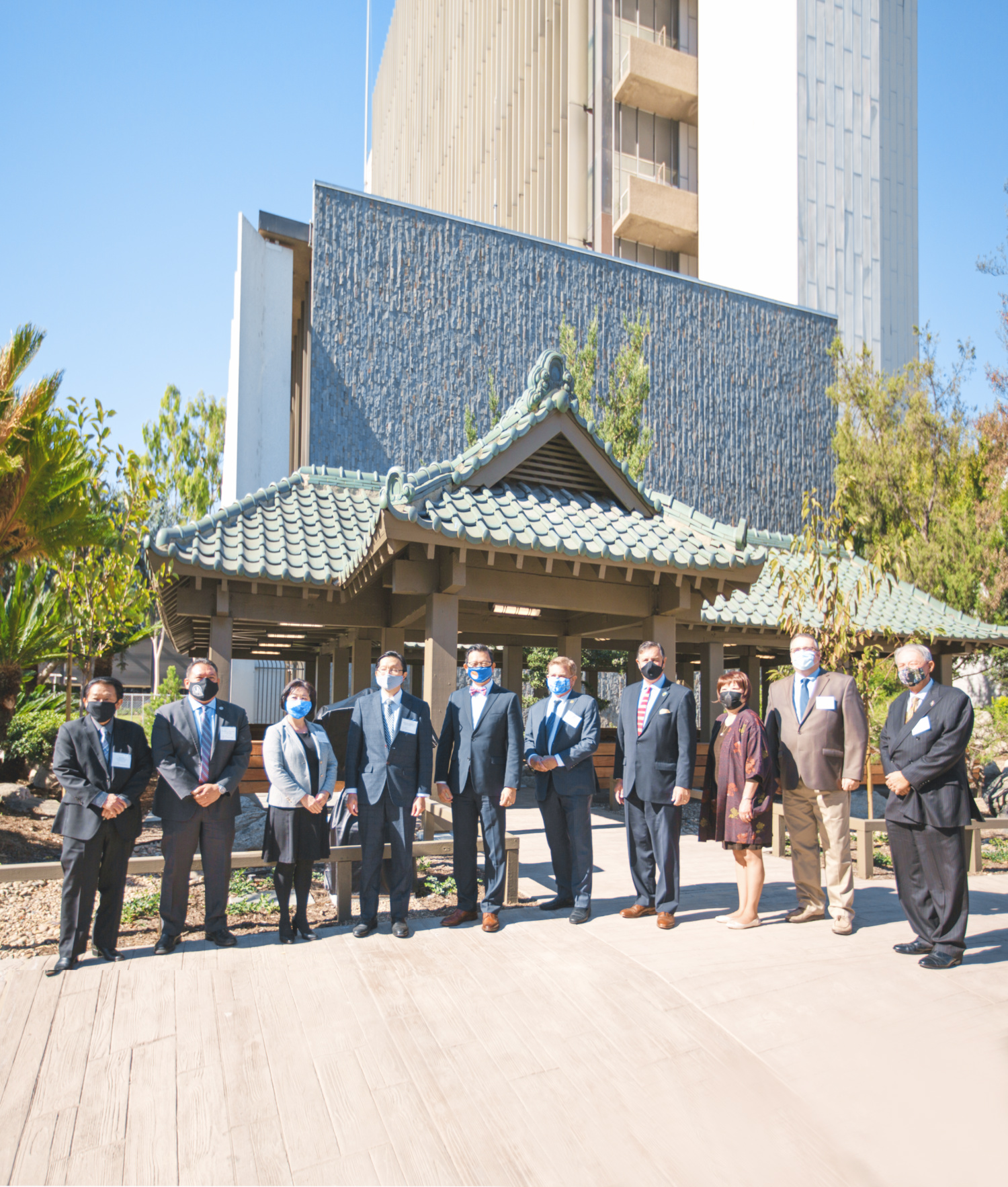
Individuals recognized by the Orange County Board of Supervisors for the 50th anniversary commemoration of the Orange County Japanese Garden and Teahouse on Nov. 10 in the Orange County Civic Center in the City of Santa Ana. Pictured (from left) are Ron Ono, City of Santa Ana; Mayor Pro Tem Juan Villegas, Santa Ana City Council; Supervisor Lisa Sato Bartlett, OC Fifth District; the Hon. Consul General of Japan Akira Muto; Vice Chairman Andrew Do, OC First District; Supervisor Doug Chaffee, OC Fourth District; Supervisor Donald P. Wagner, OC Third District; Patti Hirahara, Orange County Japanese American History Preservationist; Chris Jepsen, Orange County Historian; and Jesse James, treasurer representing the Orange County Nikkei Coordinating Council. (Photo: 7 Dreams Productions)
In honor of its 50th anniversary, the Orange County Japanese Garden and Teahouse celebrates its milestone with a COVID-19-safe event.
By Guadalupe Carrasco, Contributor
Due to the ongoing pandemic brought on by COVID-19, opportunities to share historic milestone stories with the public have been challenging. However, in keeping with strict city and county health guidelines, the County of Orange was able to hold a safe event to celebrate a cultural landmark within the Japanese American community.
The County of Orange, in cooperation with the City of Santa Ana and the Orange County Nikkei Coordinating Council, hosted a commemoration event in honor of the Orange County Japanese Garden and Teahouse’s 50th anniversary on Nov 10. The event, opened to a small number of invited guests, honored the traditions of the Japanese culture and heritage of the Japanese American community.
One year ago, the county was made aware of the upcoming anniversary of the Orange County Japanese Garden and Teahouse due to a bronze plaque commemorating the structure’s dedication on May 27, 1970, which is on display in the garden. After numerous communications, the wheels were put into motion to have the garden and teahouse renovated by the Orange County Civic Center Authority (City of Santa Ana/County of Orange), find documentation about the history of the garden to create a special commemoration event on its 50th anniversary and find both the people who were part of the original fundraising committee of the Japanese American Community Services Inc. (JACS), as well as the original Issei adviser descendants.
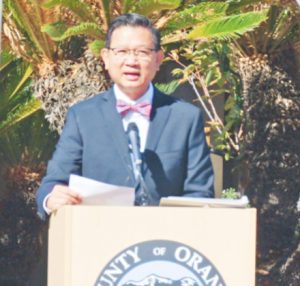
Vice Chairman Supervisor Andrew Do, First District, Orange County Board of Supervisors, offers welcome remarks on behalf of his district, which includes the City of Santa Ana and the Orange County Civic Center, where the Japanese Garden and Teahouse has thrived for 50 years. (Photo: Patti Hirahara)
With the garden being in the jurisdiction of the Orange County Board of Supervisor’s First District, Vice Chairman Andrew Do’s office began working on creating a large special commemorative event. However, as the COVID-19 pandemic grew into epic proportions earlier this year, staff began brainstorming alternative ways to safely commemorate such a special occasion.
Documents found in the Orange County Archives by local historian Chris Jepsen showed the actual dedication was held on Nov. 15, 1970. This information gave the planning team more time to allow the garden renovation to be completed. It also created an opportunity for a smaller group to be assembled to mark this historic anniversary.
Unfortunately, many of the Japanese pioneers who were a part of this milestone garden project, as well as their descendants, had already passed away, so few clues were left of what had transpired.
With Jepsen doing further research, it was discovered that the County of Orange Civic Center Commission approved the plans for a 75-foot-by-102-foot Japanese garden, which replaced a portion of a dusty parking lot along the east wall of the new Richard Neutra-designed courthouse, that was dedicated in January 1969 (see Pacific Citizen’s Oct. 23-Nov. 5, 2020, issue).
According to County of Orange documents, “The garden, to be a gift to the County by the Orange County Japanese American community, was first proposed to the OC Board of Supervisors on Jan. 16, 1968, and approved in principle by Resolution 68-63.”
This proposal was unique since the discussion was done by the county’s chief administrative officer in an oral presentation in which no written documents were presented. It was understood that the Japanese garden was going to be funded by private donations.
In looking at the County agreement filed on July 2, 1969, the project was delayed by seven months but completed six weeks after the original projected completion date of Sept. 30, 1970. The county also agreed to accept the gift and maintain it as a Japanese garden with the recommended help of those that had the skill to prune and maintain the site for future generations.
Once the Japanese garden was accepted by the county, the county would take full responsibility for the garden and the liabilities that would arise from those that used the garden in the future. This agreement was signed by Chairman of the OC Board of Supervisors William Hirstein and Orange County JACS Chairman Hitoshi Nitta.
The Japanese Garden and Teahouse was dedicated on Nov. 15, 1970, and now, 50 years later, another significant ceremony was held on Nov. 10 at a small outdoor setting to rededicate and commemorate its establishment.
Orange County Supervisor Lisa Sato Bartlett, Fifth District, served as the event’s master of ceremonies, and she led the Pledge of Allegiance with the assistance of Orange County’s own 95-year-old Don Miyada, who is one of the last surviving members of World War II’s 100th Infantry Battalion/442nd Regimental Combat Team.
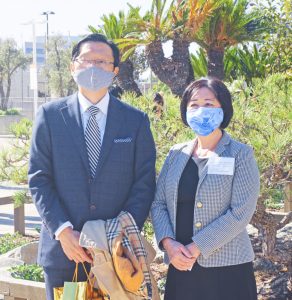
Hon. Consul General Akira Muto and OC Supervisor Lisa Sato Bartlett (Photo: Patti Hirahara)
“It was my honor and privilege to participate in the 50th anniversary celebration of the Japanese Garden and Teahouse,” Supervisor Bartlett said. “This is a very special place and a wonderful tribute to the Japanese American community for their many contributions to Orange County over the years.”
She then proceeded to introduce the event’s honored guests, which included the Hon. Consul General of Japan in Los Angeles Akira Muto and his wife, Misako; Supervisor Do, representing the First District and Vice Chairman of the Orange County Board of Supervisors; Supervisor Doug Chaffee, representing the Fourth District; Supervisor Don Wagner, representing the Third District; Juan Villegas, Mayor Pro Tem of the City of Santa Ana; the Hon. Kirk Nakamura, presiding Judge of the Orange County Superior Court; David Yamasaki, court executive officer of the Superior Court of California, County of Orange; Ryan Yoshikawa, SELANOCO JACL president; Miyada and his wife, Setsuko, representing the Kazuo Masuda VFW Memorial Post 3670; Takashi Kushi, Orange County Gardeners Assn. vp; and Michael Komai, publisher and president of the Rafu Shimpo, Los Angeles Japanese Daily News.
Representing the JACS, the original organization that spearheaded the fundraising efforts for the Orange County Japanese Garden 50 years ago, were Diane and Hitoshi A. Nitta, whose father, Hitoshi, was chairman of JACS and whose grandfather, Shosuke, was a garden Issei adviser; JACS Charter Board Member Keiko Sadakane and Janice Munemitsu, whose father, Tad, was a JACS board member and canvassing chairman and whose grandfather, Seima Munemitsu, was a garden Issei adviser.
In attendance from the Orange County Nikkei Coordinating Council were Jesse James, treasurer and Orange County Japanese Garden project coordinator; and Kenneth Inouye, who was the 2019 OCNCC Nisei Week Japanese Spirit honoree and an OCNCC representative.
Supervisor Do was then asked to give welcome remarks on behalf of the First District. “The Japanese Garden and Teahouse is an expression of the resilience and vibrancy of the Orange County Japanese American community. … The history of the garden has been a well-kept secret for 50 years. But with this rededication, especially with the upcoming completion of the County Civic Center and our new soon-to-be completed County Administration North building, the Japanese Garden and Teahouse will continue to thrive and be used by our residents for the next 100 years,” said Do.
Consul General of Japan in Los Angeles, Akira Muto, stated that he and his wife were honored to join in this special occasion.
“I extend my gratitude for all the contributions made by the Japanese American pioneers who established the foundation of the dynamic community we have been blessed with today,” Consul General Muto said. “The garden is an excellent example of where grass-roots exchanges have brought greater understanding.”
Juan Villegas, mayor pro tem of the City of Santa Ana, then presented a Certificate of Recognition to the Orange County Nikkei Coordinating Council. Villegas reminisced about his 31-year career in law enforcement and how one of his favorite memories was being assigned to look after this Japanese garden as a member of the Orange County Sheriff’s Department.
The Orange County Board of Supervisors also presented a proclamation to the Orange County Nikkei Coordinating Council for their support on the project.
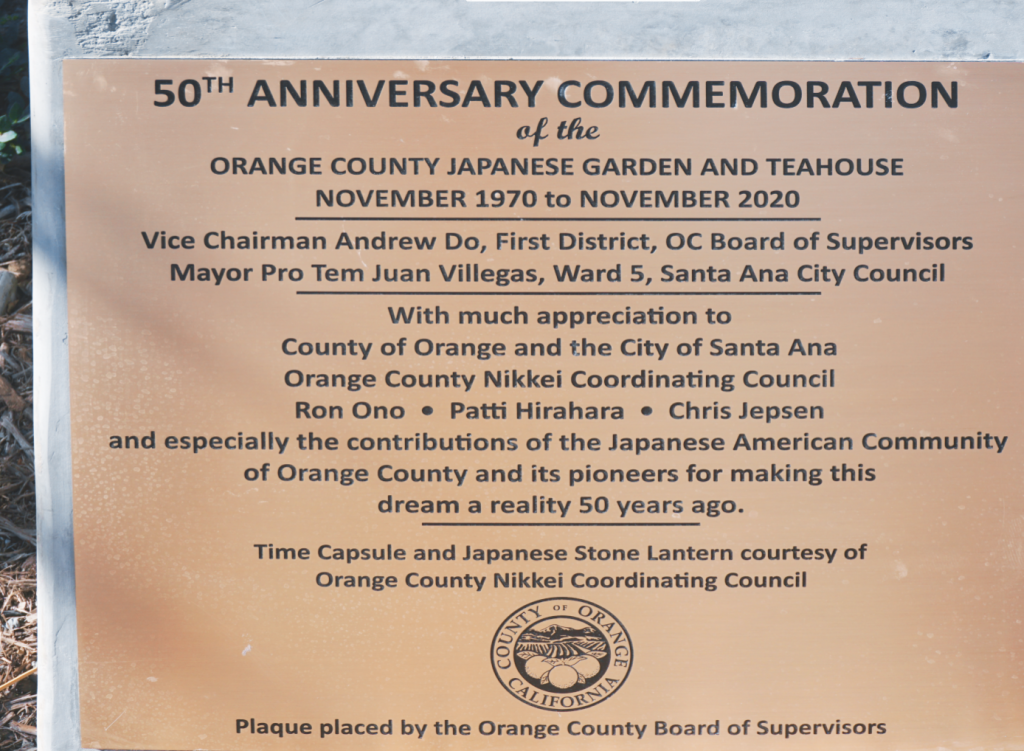
The 50th Anniversary Commemoration Plaque of the Orange County Japanese Garden and Teahouse, November 1970-November 2020 (Photo: Patti Hirahara)
To conclude the rededication ceremony, a special plaque unveiling was made by the Orange County Board of Supervisors and the Orange County Nikkei Coordinating Council to honor those that made the 50th anniversary of the Orange County Japanese Garden and Teahouse possible.
The following three individuals were honored on the plaque for their significant work on this yearlong project.
They were Ron Ono, administrative services manager/landscape architect for the City of Santa Ana; Chris Jepsen, Orange County Archives assistant archivist and president of the Orange County Historical Society; and Patti Hirahara, administrator of the Hirahara Family Collections and Orange County Japanese American history preservationist.
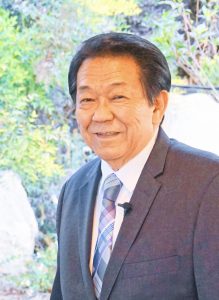
Having worked for the City of Santa Ana for 51 years, Administrative Services Manager and Land-scape Architect Ron Ono was honored for his work on acquiring funding for the renovation of the Or-ange County Japanese Garden and overseeing the renovation in time for its 50th anniversary and rededication on Nov. 10. (Photo: Patti Hirahara)
Ono was responsible for securing funding for the renovation of the 50-year-old garden. In asking him why he felt it was important for the garden to be renovated, he said: “The Japanese Garden and Teahouse represents a proud and unique symbol of the Japanese culture. The many Japanese American families that originally donated to build this unique facility were someway affected by the tragedy of the Japanese American incarceration and their displacement. These pioneers and their children wanted to give back to Orange County a symbol of peace, gratitude and respect in this beautiful place.
“I feel their efforts to give back should be preserved for all to remember as a gift that keeps on giving,” he concluded.
Jepsen was critical in finding documents that provided historical reference for this Orange County Japanese Garden project. Since there was no central file of information, the Orange County Archives is now creating a file on the Orange County Japanese Garden with original blueprints, photographs, documents and news clippings that will tell the history of the garden for years to come. The original documents will be stored at the archives and a copy of all the information will be placed in the time capsule.
The final person named on the plaque is Hirahara, who made the original inquiry about the garden to notify the County of Orange and the City of Santa Ana about its milestone anniversary, worked to find descendants of the original committee, as well as those that worked on the project, helped to share original documents she had found in her family’s records to honor the more than 643 organizations and families that donated to the garden and worked with Supervisor Do’s office to help organize the rededication.
The County of Orange and the Orange County Nikkei Coordinating Council are hoping to have a community event next year where members of the Japanese American community will be able to view the garden and witness the time capsule ceremony.
The event is subject to COVID-19 restrictions and guidance.
The Orange County Japanese Garden has survived for 50 years, and its Japanese pioneer spirit still shines through this pandemic. With the current renovation completed, it is the Japanese American community’s wish that this special gift will be enjoyed by all who visit. Currently, the garden is closed to the public but hopefully will be reopened soon.
❖❖❖
Lisa Bartlett: A Profile of Moral Courage
A personal perspective of the Orange County member of the Board of Supervisors
By Kenneth K. Inouye, Contributor
Lisa Sato Bartlett is a member of the Orange County Board of Supervisors, serving the Fifth District. She was elected to this position in 2014 and has served as the chair of the Orange County Board of Supervisors on two separate occasions; she is currently serving her second term as a member of the Board of Supervisors.
I had the privilege of working with Supervisor Bartlett while I was serving as an appointed member of the Orange County Human Relations Commission.
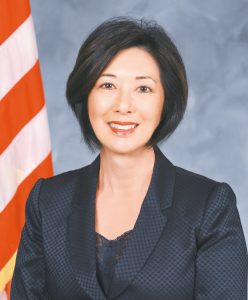 During the time that I worked with her, I noted that Supervisor Bartlett consistently supported activities that recognize the needs of the diverse population that lives/works in Orange County.
During the time that I worked with her, I noted that Supervisor Bartlett consistently supported activities that recognize the needs of the diverse population that lives/works in Orange County.
She is truly one of the best examples of an elected official who advocates for the rights and interests for all the people in Orange County, not just those from her political party or supporters.
Supervisor Bartlett recently received the JACL’s Japanese American of the Biennium award in the field of political/public affairs for her many years of public service and the moral courage that she exhibited when she publicly accused a sitting member of the California Assembly of harassment.
The assemblyman sought the endorsement of the powerful Orange County Republican Central Committee as he sought to run for another term.
She made these accusations even though her prior allegations against this assemblyman had been previously swept under the rug (the assemblyman had strong allies within the Republican party).
It should be noted that since Supervisor Bartlett filed her complaints, three other women have stepped forward to accuse the assemblyman of having made unwanted advances toward them as well.
By making these allegations, Supervisor Bartlett placed herself in the awkward position of being a whistleblower against a senior elected official from the same political party.
When she was questioned why she would “betray” her own political party, Supervisor Bartlett stood firm and said, “We cannot continue to endorse someone who uses his title and the powers of his office to prey on women.”
It should be noted that Supervisor Bartlett knew that her actions could have an adverse impact on her political career, but she also knew that her willingness to come forward would encourage others who might have similar circumstances to also come forward as we strive to create an America where ALL WOMEN can live free of harassment of any kind.
My fond hope is that Supervisor Bartlett’s actions will help pave the way for other policy makers to make their decisions based upon principles and what is right for their constituents as opposed to sticking to the “party line,” which is often based on self-interest and political gain.
America can truly be a better place if ALL OF OUR ELECTED OFFICIALS had the moral courage of Supervisor Bartlett.



